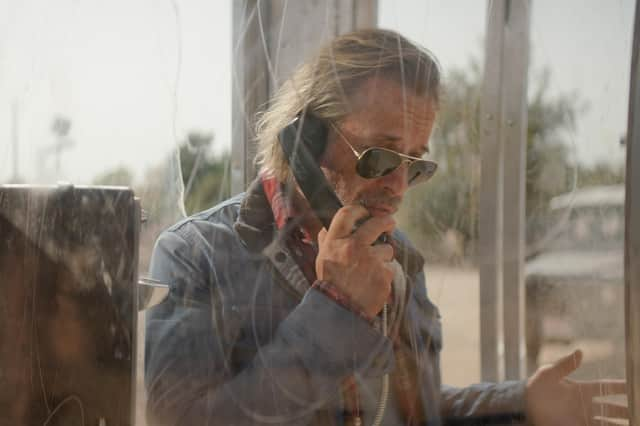Film reviews: The Infernal Machine | Lynch/Oz | Tori & Lokita


The Infernal Machine (15) ***
Lynch/Oz (15) ***
Tori and Lokita (15) **
As a reclusive author living off the grid somewhere near the US-Mexican border, Guy Pearce’s character in The Infernal Machine looks like a grizzled modern-day western outlaw. Lank hair, hangover stare, salt-and-pepper beard, denim duds… he could pass for one of the taciturn protagonists from the Coen brothers' No Country for Old Men or David Mackenzie’s Hell or High Water – until, that is, he opens his mouth. When he opens his mouth, he sounds more like Alan Bennett. It’s a little discombobulating to say the least. But that’s also the point. Pearce’s unexpected Yorkshire accent is the film’s playful way of tuning us into the rug-pulling nature of a story built around the fictions writers create about themselves while creating their own opuses.
In Pearce’s case, his character, Bruce Cogburn, has pulled a JD Salinger, retreating from public life following a gun atrocity 25 years earlier. The Mark Chapman/Charles Whitman-esque murderer claimed Cogburn’s cosmic doorstopper-of-a-novel instructed him to kill and we’re led to believe Cogburn hasn’t typed a word since. As the film opens, though, he’s gradually being drawn out of his self-imposed, myth-courting isolation by an aspiring biographer whose obsessive attempts to contact him by letter are forcing him to leave repeated and increasingly exasperated answering machine messages to try and ward off these epistolary intrusions into his fortress-like existence.
Advertisement
Hide AdWhat follows at first is a nifty psychological drama as Cogburn’s efforts to curb someone else’s mania gradually reveal more about his own mental state. But writer/director Andrew Hunt also expands the scope of this paranoid mystery, transforming the one-sided exchange into a larger conspiracy-style thriller that takes on an intriguing meta-dimension as Cogburn tries to figure out if he’s writing his own story or is actually pawn in someone else’s narrative.
Though the film itself is adapted from an episode of the popular storytelling podcast series The Truth entitled The Hilly Earth Society, Hunt’s film deviates wildly from its source material, riffing in ways both good and bad on everything from Stephen King and David Fincher, to The Twilight Zone and Black Mirror. Thanks to Pearce (and a lively supporting turn from Alice Eve as a local cop), it’s an entertaining enough concoction for much of its running time. Alas, Hunt can’t quite stick the landing and races instead towards a messy, off-the-rails finale that neither makes enough sense to tie everything together in a satisfying way nor is outré enough to fulfil the gonzo promise of its first two acts.


Documentary maker Alexandre O Philippe follows up recent video essay-style explorations of The Exorcist, Psycho and Alien with Lynch/Oz, a mostly fascinating examination of the cinematic Venn diagram that exists between the work of David Lynch and the original film version of The Wizard of Oz. Lynch himself has never made any secret of his love for Victor Fleming’s beloved 1939 masterpiece; his 1990 Palme d’Or-winning road movie Wild at Heart was a blatant, sex-and-violence-soaked spin on it. But Lynch’s love goes much deeper than Wild at Heart’s obvious surface parallels and Philippe attempts to use The Wizard of Oz’s status as the foundational fairytale of American pop culture to decode this most playfully cryptic of filmmakers.
To do so he’s assembled a mix of six critics and filmmakers to muse on the different ways Lynch’s films are in conversation with The Wizard of Oz, an approach that provides plenty of dreamy insights, but watched one after another can also have a slightly soporific effect, something Philippe consciously tries to counteract by using John Waters’ wry, anecdote-heavy contribution to pep things up around the half-way point. Elsewhere, Jennifer’s Body director Karyn Kusama’s segment about watching Lynch’s 2001 masterpiece Mulholland Drive as an inversion of The Wizard of Oz is the most eye-opening. But there are also head-noodling observations from the likes of A Ghost Story director David Lowery and Something in the Dirt directors Justin Benson and Aaron Moorhead, whose respective segments dwell on the darker lore surrounding the production of The Wizard of Oz and how this might have fed into the malevolence inherent in a lot of Lynch’s films. At a time when social media worship of Lynch borders on banal cult-like devotion, it’s a relief to get some interesting new perspectives on his work.
Like a lot of recent Ken Loach films, the new offering from the Jean-Pierre and Luc Dardenne sees them slipping into a mode of social realism that relies on the harsh injustices being highlighted to distract from some pretty melodramatic plotting. In Tori and Lokita they take on the terrible plight of African migrants in modern-day Europe with a story about a young boy from Cameroon called Tori (Pablo Schils) and an older teenage girl from Benin called Lokita (Joely Mbundu). They're pretending to be brother and sister to help the latter get the official papers she needs to work. But the authorities don’t buy their story, so they end up dealing and farming drugs for unsympathetic gig workers instead. Heaping misery upon misery, the film is at its best when showcasing the strength of the sibling-like bond Tori and Lokita genuinely do forge when they realise they have no-one else to rely upon (newcomers Schils and Mbundu are a winning combination too). Alas, all their exploiters feel like stock movie villains and, perhaps as a result, the story ends up playing out in rote, tragic fashion.
The Infernal Machine and Tori and Lokita are in cinemas from 2 December; Lynch/Oz is on selected release and on demand from 2 December.